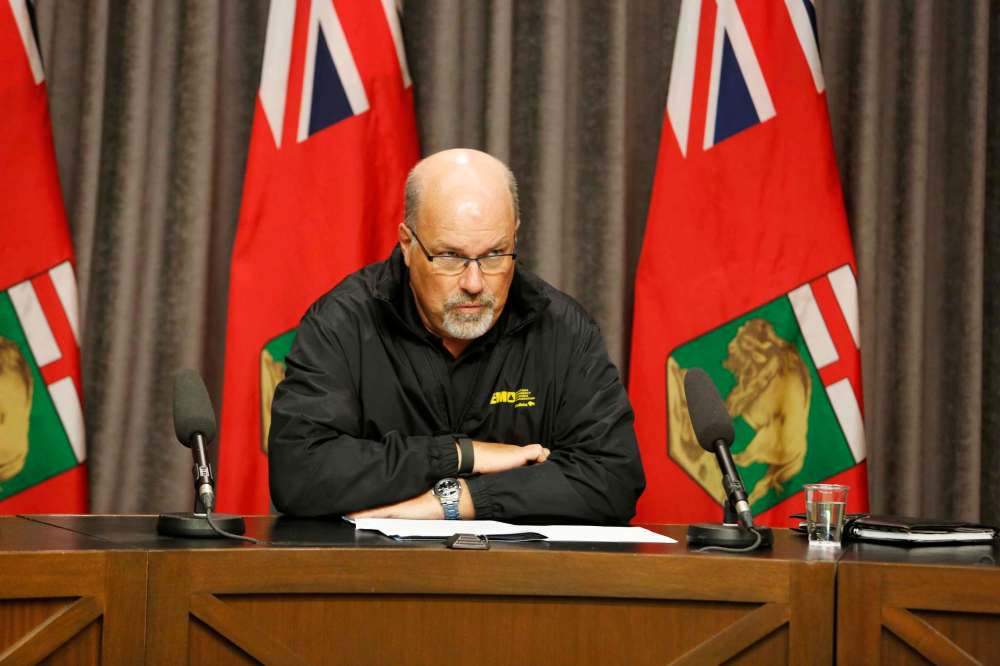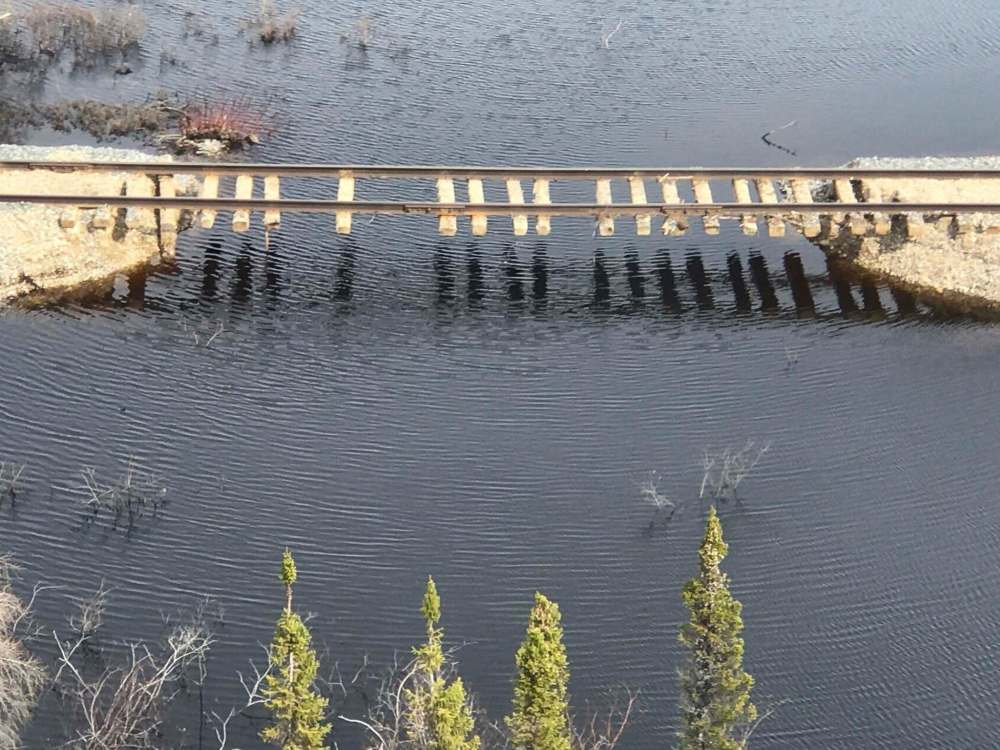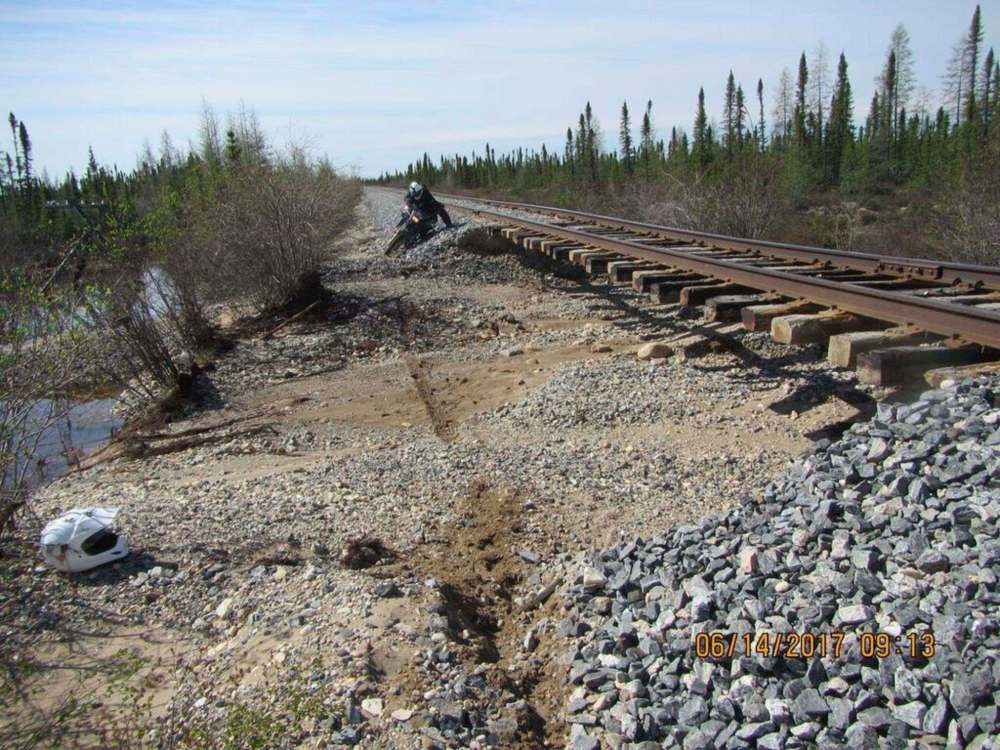Province has no plan to survey Omnitrax damage for itself
Advertisement
Read this article for free:
or
Already have an account? Log in here »
To continue reading, please subscribe:
Monthly Digital Subscription
$19 $0 for the first 4 weeks*
- Enjoy unlimited reading on winnipegfreepress.com
- Read the E-Edition, our digital replica newspaper
- Access News Break, our award-winning app
- Play interactive puzzles
*No charge for 4 weeks then billed as $19 every four weeks (new subscribers and qualified returning subscribers only). Cancel anytime.
Read unlimited articles for free today:
or
Already have an account? Log in here »
Hey there, time traveller!
This article was published 21/06/2017 (2512 days ago), so information in it may no longer be current.
Manitoba is relying entirely on the fed-up owner of the Hudson Bay Railway to assess the flood damage to Churchill’s lifeline, rather than send government engineers to see it for themselves.
“(Omnitrax is) a reputable firm, we expect to get a reputable report,” Lee Spencer, assistant deputy minister for emergency measures with Manitoba Infrastructure, told a news conference Thursday afternoon.
“I don’t think we’d be in any better position with our own engineers,” he said. There is no plan to have Manitoba staff look at the rail lines, even by helicopter landings at damage sights. We have photographic evidence of what water was doing to the line.”
The rail line from north of Gillam to Churchill closed May 23 after extensive spring flooding. Colorado-based Omnitrax, which owns both the railway and the Port of Churchill, says the damage is so extensive that repairs won’t be completed before next spring, which has sparked fear of fuel and food shortages in the northern town that has 900 residents.

While he expressed the province’s faith in Omnitrax’s reputation, Spencer did not address photos taken by a Colorado motorcyclist that were published in the Free Press Wednesday. Adventurist Steve Green rode a dirt bike along the rail line from Thompson to Churchill and took photos — date-stamped last Friday, June 14 — along the way that indicate the damage is nowhere near as severe as what has been described by Omnitrax.
A day earlier — June 13 — the company released “new photos” to Global News that showed washed-out sections of the line surrounded by flood waters coursing under the track. Other photos that surfaced that week showed sections that were submerged.
“The water is not covering the tracks anywhere… and has receded well away from the rail bed,” Green told the Free Press this week.
Omnitrax has refused to confirm the date when the water receded from the railbed.
Spencer said Thursday that more than 15 agencies from eight provincial departments, the federal government and the town are meeting regularly to discuss supplying Churchill with food, fuel and other essentials during the indefinite closure of the rail line.
They’re talking with Omnitrax about the condition of the rail line and a timetable for repairs, Spencer said. But so far, “We haven’t received a response to our latest request” for information, he said.
Spencer said it’s too early to speculate about the possibility Omnitrax will not repair the only land link to the Hudson Bay community. Omnitrax has made no secret of its desire to sell the the railway and port; it claims the railway has lost $30 million since the firm bought it from the federal government in 1997.
For more than a year, Omnitrax has tried to sell both assets to a consortium of northern First Nations. A deal in principle was reached earlier this month, but the consortium has said publicly it needs financial support from the federal and provincial governments in order to complete the purchase.
The premier’s office had Spencer meet with reporters Thursday, with no politicans in attendance, to provide an update on the effect of flooding.

But the “update” offered little beyond Spencer saying that the province is waiting — for news from Omnitrax and from Ottawa for details about its Nutrition North federal food-subsidy program.
“We’re looking to partner with the Nutrition North Program,” he said, adding the province has already increased the food subsidy for about 100 people in Churchill who collect employment and income assistance.
Meanwhile, major food-shipper, the North West Company, announced late Wednesday it will stop subsidizing most of the items it sells in the town.
“The suspension of rail service to Churchill is a public infrastructure failing that is being borne 100 per cent by the citizens, businesses and other organizations in Churchill,” company CEO Edward Kennedy wrote. “If this crisis was in a rural or urban area, action would have been taken within days.”
The notice says the company has absorbed the added cost of air shipments since the railway closure, but claims it would cost $700,000 a year in added costs to serve the community.
“North West advised both levels of government last week that it was only prepared to keep subsidizing prices until June 25. Prices will begin to reflect air freight costs on that date,” though not on some key items such as milk, the release said.
The statement comes amid confusing messages from the federal Liberal government. A blunt email Wednesday afternoon from Department of Indigenous and Northern Affairs spokeswoman Valérie Haché told the Free Press: “Churchill has not qualified for the food subsidy.”
But a top department spokesman clarified hours later the minister was looking at potential costs and needs before deciding whether to grant an emergency authorization for Churchill to qualify for the Nutrition North Program.
“It has not been decided yet; it has not been rejected. We are working on it,” wrote James Fitz-Morris.
The company feels that subsidies are needed immediately “which Churchill clearly now qualifies for,” and says it can’t arrange marine shipments until the fall, which would still be more expensive than rail transportation, but less costly than air.
“Until the sealift arrives in October, assistance is also needed on non-perishable items. The long-term solutions may be complicated but the immediate ones are not.”
Spencer said Manitoba is helping to arrange shipment by sea of additional storage equipment in Churchill, so the town can stockpile fuel supplies for the winter. The private sector is handling delivery, but the province is helping ensure that two or more companies co-operate so ships go out with a full load.
“Open-water access is relatively short,” he said.
That sea access is usually dependable until the first week of October, he said. Barges from Moosonee in Ontario take about two weeks to get to Churchill, depending on weather, but Spencer was unable to say how long it takes freighters to reach Churchill from Montreal.
Premier Brian Pallister told reporters earlier Thursday that the province is urging Ottawa to take action.
“I think the idea that we’re following is to approach it as something that’s urgent, important and address it as best and as effectively as we can,” he said. “We’re working with the community. We’re also reaching out to the federal government to include Churchill in their existing program in terms of the food-subsidy issues, because those are issues that aren’t going to go away in the short term.”
Pallister said provincial officials are in daily contact with community leaders on how to best get supplies shipped to Churchill.
“We’ve got to address these issues with some foresight because when winter sets in, freighters aren’t going to be an option,” he said. “Co-ordinating these things is really important. Only when that is done, will we understand what the differences are in terms of real costs for the people there, and that’s when you can assess the need for subsidization. Right now, we’re all struggling to figure out what the impact will be of alternative approaches.
“I recognize the long-term issues, they’ve been there for some years.”
— with files from Dylan Robertson
nick.martin@freepress.mb.ca
stefanie.lasuik@freepress.mb.ca
History
Updated on Thursday, June 22, 2017 7:13 PM CDT: Adds photos
Updated on Thursday, June 22, 2017 9:24 PM CDT: updates first two paragraphs
Updated on Friday, June 23, 2017 11:56 AM CDT: Typo fixed.






